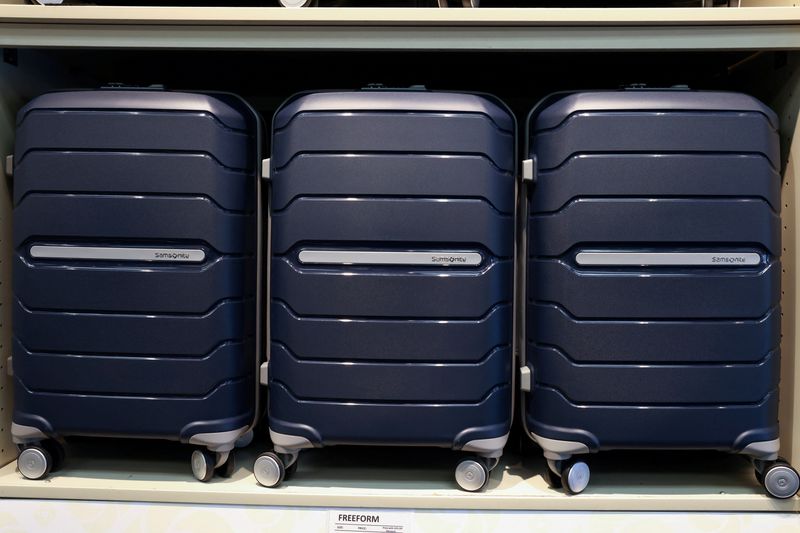(Reuters) -Shares of Samsonite International dropped as much as 12% to their lowest level in almost a month on the Hong Kong stock exchange after the luggage maker said on Friday it plans to seek a dual listing.
The company, which also owns the American Tourister and Tumi luggage brands, did not say which exchanges it was considering for the second listing but two people familiar with the situation said the U.S. was a likely venue.
Samsonite said the dual listing was aimed at increasing the liquidity of its shares and to reach more investors. The plan is at an early stage, it said.
"While this move may benefit its liquidity and expand investor base in the mid-to-long-term, we expect the share price to react negatively given potential share dilution," Citi Research said in a client note.
Indeed, the shares slumped as much as 12% after the news. By midday, they were down close to 9% at HK$27.95, compared with a 3% decline in the Hang Seng Index, LSEG data showed.
Still, Citi said Samsonite's valuation remained attractive on expectations that sustained travel demand will drive luggage demand, among other factors. It maintained a "buy" recommendation on the stock with a target price of HK$36.80.
Other global brands, such as beauty-shop chain L'Occitane and fashion house Prada (OTC:PRDSY), have also considered additional listings beyond Hong Kong, where valuations have dropped in the decade since booming private wealth persuaded non-Asian brands to raise their profile in the region.
Samsonite, founded in the U.S. in 1910, said an additional listing would allow it to reach investors in markets that are an important part of its global footprint and growth drivers for its business.
The company explored a take-private deal earlier this year and has held discussions with advisers and investors, Reuters has reported.
The company said its board decided to pursue a dual listing after a preliminary review of its options.
"The Asia market continues to be incredibly important for the group's core brands, and the company looks forward to continuing to successfully grow its business there and in other regions around the world," Samsonite said in its filing.
Asked if Samsonite would consider a U.S. listing, the company said in an emailed response to Reuters that it has nothing to add beyond its filing.
"We will make further announcements in accordance with applicable laws and regulations, as and when appropriate," its spokesperson said in the email.
Samsonite debuted on the Hong Kong stock exchange in 2011 at a time when several brands including L'Occitane and Prada wanted to raise their profile among Asian consumers and tap the growing wealth of consumers in Asia, especially in China.
But valuations of Hong Kong-listed companies have sagged in recent years amid some economic weakness since 2019's pro-democracy protests, China's slowing economy and its tension with the U.S..
Other companies are choosing different options.

Chinese billionaire entrepreneur and Olympic champion Li Ning is considering taking his namesake sportswear company private from the Hong Kong stock exchange, Reuters reported on March 12.
Shares of Samsonite have climbed 19.22% since the start of the year as tourism in Asia rebounded. The company's market capitalisation was $5.69 billion as of Thursday, LSEG data showed.